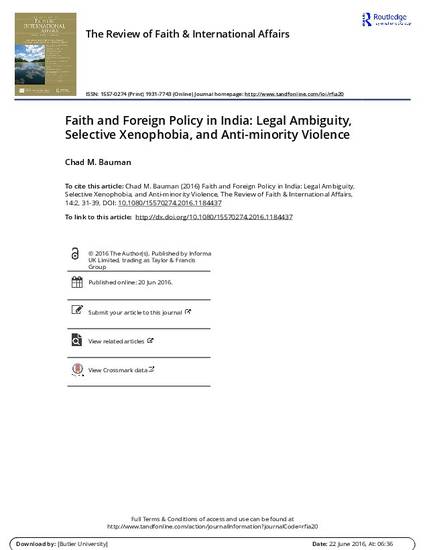
Article
Faith and Foreign Policy in India: Legal Ambiguity, Selective Xenophobia, and Anti-minority Violence
The Journal of Faith & International Affairs
(2016)
Abstract
As a secular democracy, India’s constitution enshrines relatively robust safeguards for religious equality and freedom. Article 25 provides all citizens the right to “freely profess, practice, and propagate” religion, and avoids assigning to Hinduism any special role or explicit privilege (in contradistinction to the situation with Buddhism in Sri Lanka, for example). Moreover, the Indian government itself has not generally engaged in any systematic or flagrant way in the direct persecution or oppression of its religious minorities.
However, India’s religious minorities do face certain challenges. Among them are several legal and judicial issues. Judicial rulings in independent India have weakened the safeguards of the constitution in several ways, such as when, in the 1970s, the Supreme Court declared that the constitutional right of “propagation” did not include (or protect) the right to intentionally convert another. Similarly, half a dozen Indian states have now passed “Freedom of Religion” laws (called “anti-conversion” laws by their critics) that have been problematically and prejudicially implemented, as has a national anti-defamation law. Additionally, national laws securing reserved seats in Indian legislatures, civil service, and educational institutions for lower-caste Hindus (but not for lower-caste non-Hindus) provide implicit disincentives to lower-caste Hindus considering conversion. Finally, a weak and easily corrupted criminal justice system exacerbates many of these legal issues, and is frequently used by anti-minority actors who exploit the legal ambiguity with regard to religious freedoms in India to harry religious minorities with spurious charges or unlawful imprisonment, thereby undermining the protections that Indian law does afford religious minorities.
In addition to these legal issues, religious minorities in India are occasionally threatened, intimidated, harassed, sexually assaulted, and attacked by their neighbors, in both small-scale, isolated incidents and in the context of large-scale riots. While the perpetrators of these incidents are not state actors, generally speaking, they do in many cases enjoy the explicit or implicit support of local or even national law enforcement and political officials. For example, local, regional, state, and even central governments have been accused, at various times, of intentionally responding slowly, or even inhibiting a police response to instances of anti-minority violence.
The more secular of India’s two dominant political parties, the Indian National Congress (or “Congress”) party, has occasionally been linked to anti-minority activities, most notably in the anti-Sikh bloodletting that took place after the party’s powerful prime minister, Indira Gandhi, was assassinated by her Sikh bodyguards in 1984. Nevertheless, accusations of involvement in anti-minority activities are far more regularly leveled, and justifiably so, at the broad association of nationalist social, religious, and cultural organizations called the Sangh Parivar (or “Sangh”), and at the political party associated with it, the Bharatiya Janata Party (BJP, “Indian People’s Party”). It is for this reason that the BJP’s resounding national electoral victory in late 2014 appears to have emboldened anti-minority social and state actors, and has caused India’s religious minorities a great deal of concern.
In what follows, I provide the minimum amount of historical and contextual information necessary to understand contemporary dynamics at a basic level. After that, I describe the contemporary situation in more detail. In the final section, I provide some recommendations to US foreign policy specialists on how to intervene (and/or not intervene) productively in support of religious freedom and religious minorities in India.
Keywords
- foreign policy,
- india,
- hindu,
- christian,
- muslim,
- minority,
- violence,
- law,
- oppression,
- persecution,
- religious freedom,
- attack
Disciplines
Publication Date
June 20, 2016
DOI
10.1080/15570274.2016.1184437
Citation Information
Chad M Bauman. "Faith and Foreign Policy in India: Legal Ambiguity, Selective Xenophobia, and Anti-minority Violence" The Journal of Faith & International Affairs Vol. 14 Iss. 2 (2016) p. 31 - 39 Available at: http://works.bepress.com/chad_bauman/67/
